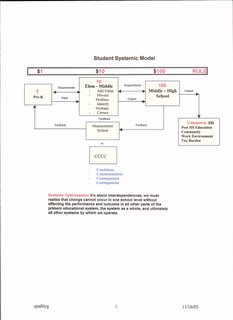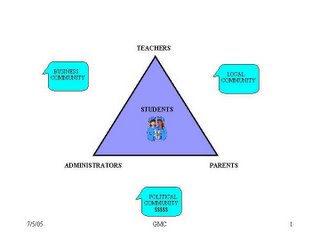
Below is part of the approval memorandum that approves the increase in High School Graduation Requirements. Following this I asked a number of questions about the survey. I tried to respond on the State Educational Site but it would not go through their system.
December 13, 2005
LANSING - The State Board of Education unanimously approved today a set of increased state high school graduation requirements for all Michigan students.
Four years of math and English language arts and three years of science are among the requirements; as well as three credits of social studies, two credits of world languages, and one credit each of health/physical education and visual and performing arts. Currently, only one semester of civics is required for high school graduation under state law.
"This change was absolutely necessary," said State Board of Education President Kathleen N. Straus. "With the evolving economy and global pressures on what education and skills students will need for the jobs of today and tomorrow, we needed to act now."
"What we've done here today is so very important for the future of the State of Michigan," Straus added, It is not just for the students, but for the future of the entire state."
The requirements include what is being called the Michigan Merit Curriculum that combines a core list of rigorous academic classes, along with a list of 21st Century skill sets that will be integrated and taught in all courses.
The Michigan Merit Core of academic courses in the State Board's plan include:
four years of English language arts;
one year each of Algebra I, Geometry, Algebra II, and an additional math class in the senior year;
one year each of Biology; Physics or Chemistry; and one additional year of science;
three years of social science, which must include a semester of civics and a semester of economics;
two years of world languages;
one year of health/physical education; and
one year of visual and performing arts.
The State Board also requires that all high school students take the Michigan Merit Exam, or the alternate MI-ACCESS assessment for students with severe disabilities; and that all students complete at least one on-line credit or non-credit course or learning experience, in order to graduate. See related story at Michigan Considers Requiring High-School Students to Take at Least One Online Course
The basis of the recommendations was collected by a research task force of education experts commissioned to study the issues and investigate the best practices of five other states that have implemented high school graduation requirements.
What follows are some questions I have regarding the High School Content Expectations. The document can be found at High School Content Expectations.
1) When presenting expectations/requirements there should be developed and associated corresponding goals, milestones, project plan and dates. Where can I find these plans?
2) The presentation package tells me the "What," Where can I see the "How?"
3) I found expectations for English Language Arts and Mathematics; will there be a presentation and expectations for Music, Art, Band, Phys Educ and Technology?
4) The presentation often refers to "ALL" high school students. Does this mean that every student's activities will be documented and tracked for on-going learning? I do not mean Report Cards, or MEAP Tests. It is a known fact that there are thousands of students who can't read, how will they be brought up to speed to include them in the "ALL" category?
5) It states in the presentation "Revise and extend the current Michigan Curriculum Framework High School Standards and Benchmarks." I like this statement, does it mean that more Standardization will take place and reduce the wide range of variation that currently exists between school districts and school to school within the same district? My point is many school districts still use the Carnegie Unit method of counting credits and other non-standard practices; will the new expectations change this situation and drive standardization? Who will monitor and When will this be done? All improvement efforts must begin and end with standardization.
6) The presentation also says, "Aligned with national standards and recommendations." So does this mean we will be aligning with National and Michigan Standards (Question # 5)? I really need to see the plan that explains the How's?
7) Rigor and Relevance "Master content knowledge" does this mean the current standard GPA of 1.5 or 1.6 will still be accepted for Graduation? Need much more information on this topic.
8) I like the slide that says, "Make connections between what they read, hear, and learn in class and the world around them, develop leadership qualities." I hope this means that the education society will partner with the business community to help provide this type of expertise. I"m sorry but most teachers do not have these skills. For many of them the only time they have left their hometowns or worked in a business is when they attended college. The state needs to tighten its qualifications and certifications for these skills.
9) High School Math - Need separate topic on Variation (common & special cause).
10) Transformational Thinking - "Systems Thinking" should be included in order for the students to understand life's interdependencies.
12) Your Timeline states that a "Web/Field Review" will be taking place in Mid-January 2006, will you be providing the details, locations and results of these reviews. What Department will be leading the reviews?
Additional information at State Board of Educ - Improving student outcomes
I recommend we Grandfather the current students enrolled and start the passing and failing in the year 2015. My method of thinking is based on the number of students in the later grades (8-12) who are struggling at current expectations that won't pass regardless of what numbers you throw to the wind.
Click on pictures twice (2) to enlarge

I am NOT saying to do nothing until 2015. I'm saying go through with the current plan. Test it in geographic and economic areas that will provide the best end-to-end data. Hold School Administrators, Teachers and Parents accountable and begin changing this culture now WITHOUT PUNISHING THE CURRENT STUDENTS IN THE SYSTEM. WE CREATED THE SYSTEM AND THE STUDENT SHOULD NOT SUFFER FOR "ME" TYPE LEADERSHIP THAT CREATED THE OLD AND CURRENT SYSTEMS. There is no way with the current system in place to reach the stretch expectations as stated by Mr. Flannagan. The big three shown around my triangle below must be equally addressed. Failure in one area drives poor learning. Blaming one group (teachers vs. parents vs. administrators vs. teachers) is idiotic and bribing kids (awards) to go to college and high school is just plain lame!
 Please realize our current system is flawed (throwing more money at the problems will not fix them) . By continously adding all of these so-called special committees and departmental fixes without knowing how they cause variation to the current system will only make it worse. Start tracking current students entering school. Do not track/measure any other item unless it aligns with the success of the student.
Please realize our current system is flawed (throwing more money at the problems will not fix them) . By continously adding all of these so-called special committees and departmental fixes without knowing how they cause variation to the current system will only make it worse. Start tracking current students entering school. Do not track/measure any other item unless it aligns with the success of the student.Current MEAP and other type tests take snapshots (stand alone data) of student progress in selected years rather than tracking student progress (both negative & positive) over time. If you don’t track students over time (trending data), you can’t find out why one student has a higher score than another. Single-year test scores mostly reflect student quality, not school quality. A student with above average test scores and report grades is often a good student (predictable in some cases). It takes a student whose test scores are rising/reducing over trending time (on-going movie) to prove that the school is good or bad. Equally as important is the data and information that can be obtained to replicate behavior or change for the better.
Try to remove politicians and "ME" type leaders who have other agendas rather than the one at hand. They know the current proposals will take time and they will not back any major change that won't bring them immediate success. We need one consistent leader to help drive improvements. It can't be a person appointed by a governor that changes each election, nor can it be a person who is politically backed or seeks a higher position. We need a genuine leader who cares, who can make decisions and who is not afraid of change. Most of all this person can not be intimidated by politician or union officials.
update 2/12/06
I saw the following quotes in Sunday's (2/12/06) Detroit News about "Educating our Kids" by Christine Macdonald. Tough Classes scare students away"
Students are finishing with Mickey Mouse credits," said professor Sharif Shakrani (Professor Shakrani Profile, acting co-director of the Education Policy Center at Michigan State University. "If these are watered down, 10 years from now we will be where we are now."
Professor Shakrani argues Michigan has had low expectations for many students for too long and that there is no reason all can't achieve. "Can anybody prove to me that these students can't learn these things?" he said. "We aren't asking them to learn rocket science."
qualityg says ... you have got to be kidding! Professor Shakrani Sharif Shakrani is a professor of measurement and quantitative methods. His areas of expertise include Assessment and Testing
Measurement and Testing and Quantitative Research Methods.
Perhaps he should take a class on "systems thinking" (systems thinking) and behavioral management.
By "WHAT" method do you make the claim. "WHO" are "these students" you refer to in your quote? Show me the figures of your research. Using the word "all" means everybody.
Perhaps we have low expectations and if we don't change our credit system it will be the same in 10 years, but there is a large segment of student (grades 8 - 12) that are too far along in a broken system that will suffer. We need to have a transition (as I stated above) that will provide the best opportunity for all students.

One more thing Professor, can you explain to me why Michigan State's Math Department is under review? Perhaps you should invite Mickey Mouse to review your department.
I have my facts for my claims, do you have yours?
updated 2/16/06
EPIC-MRA is a full service firm located in Lansing Michigan with expertise in public opinion research and analysis conducted a survey on the requirements topic in January of this year. Below is the link to the survey.
http://www.epicmra.com/RecentSurveys.htm
qualityg says ... there seems to be a disparity as to what parents want for their children than what the Michigan Department of Education feels the students need to be successful.
If you look at my educational triangle above (see update 12/24/05) you can see the principals (admin, teachers and parents) are in disagreement according to the survey. Until there is a balance struck over these critical issues it won't matter how high you raise the standards or requirements they won't be accomplished. That goes for additional dollars too! If there is no discipline and no self-esteem present in each student it won't matter what requirements you set as standards.
Remember when the auto companies believed they knew what kind of cars we should drive and did not listen to the customer, well ... the Japanese did and they have struck a balance with the American consumer.
The arrogance and ignornace of American Leadership in business and education has led to these problems. They own the system!
Updated 4/1/06
New curriculum will change Michigan's fate
Governor, lawmakers, school board deserve credit
The new curriculum will require students to take more rigorous academic courses, with a heavy emphasis on math and science -- the skills most valued by the new knowledge economy.
qualityg says ... will someone please define for me the "new knowlege economy." If we can believe in the Pareto concept that might say 20% of the students are "B" students and above and 80% are average or below what will happen to the 80% and below? If they are at this level now, how will having tougher requirements move them into the 20%?
Students will benefit from tougher standards - Mike Boulus executive director for the Presidents' Council, State Universities of Michigan said " The core curriculum will put pressure on school districts "to hold to it when their feet are to the fire in a few years and little Johnny can't graduate."
qualityg says ... this reads like an arrogant statement to me by one of the above 20%s who think they have all the answers without answering any questions. Looks like little mikey blames the schools for this problem. Little mikey boo boo should go sit by the fire himself and look into the flames and keep saying " I have a big title so it doesn't matter if I sound like a fool."

State Senator Wayne Kuipers said "I've talked to companies who said they decided not to come to Michigan because we don't take education seriously."
qualityg says ... Senator Kuipers, I have heard/read you say many times that you have talked to these companies. How about naming these companies? I would feel better knowing what companies feel this way. Perhaps I don't like their products or services and won't purchase them anymore. Oh yeah, by what measure or methods do they have to make that statement. Geez, I hope this just isn't some jackass political frightening tactic.
Schools get more dollars but they keep cutting staff and programs (specials and vocational = less electives).
qualityg says ... this is one statement that should send shivers down the back of those second rate teachers who tyeach second rate classes. Companies don't want your kind of students (see above) or your kind of talents. Afterall, when it comes to cutting subjects your talents (names for second tier classess) really don't matter because some companies told Senator Kuipers that some companies said we don't take our education seriously. Maybe they are right, first answer my question --> How many times do the tier one teachers (so-called core subjects) threaten their students that they can't go to music , gym or art if they don't finish doing their spelling words or lab page in math?
more from qualityg ... I write and talk about systems thinking and the fact that too many decisions (as well intended as they think) are made without thinking about the whole and the effect decisions can have on other critical areas of the educational system.
For example I am going to concentrate on just one other piece of our educational system that may be impacted negatively by the tougher curriculum - HIGH SCHOOL DROPOUTS.
Source: The Detroit News, "Dropouts go back to school," Sept. 22, 2005
According to The News, DPS graduates less than 50 percent of its students in four years. It is estimated that there are more than 100,000 people between the ages of 16 and 24 in Michigan who are not in school and do not have a diploma, The News reported. DPS expects to lose 10,000 students this year.Source: Tom Watkins, Superintendent of Public Instruction
Michigan Department of Education
March 12, 2004
School Characteristics of students who drop out or are pushed out of school include:
Frustration
Unemployment, underemployment, constant lay-offs
Embarrassment due to the inability to read or do basic math
Low wages
Time in jail or prison.
Michigan has a law that makes it legal for a child to drop out, or be pushed out, of school at the age of 16. Most 16-year-olds do not have the life skills or knowledge they require to prosper in a complex, global economy.
I call this law state sponsored stupidity, at best, and institutionalized racism at worst. For that reason, I have called for a change in the legal dropout age to 18, as well as for programs to meet the needs of these students. Our current law disproportionately impacts students of color. If dropout rates were at the epidemic proportions in our white, middle class communities, there would be a collective cry for a cure.
Source: BLS
In 2005, over 400,000 students were high school dropouts according to the Bureau of Labor Statistics. Every student who drops out represents a loss of at least $6,700 (estimate) to the school district.
High schools with the worst promoting power (percentage of freshman who are still senior 4 years later) are concentrated in a sub-set of states. Nearly 80% of the nation’s high schools that produce the highest number of dropouts can be found in just 15 states (Arizona, California, Georgia, Florida, Illinois, Louisiana, Michigan, Mississippi, New Mexico, New York, North Carolina, Ohio, Pennsylvania, South Carolina, and Texas).
qualityg says ... Now, where in the new curriculum does it provide an answer to the high school dropout problem. If you look at what Tom Watkins stated above there is no way this will help the problem, in fact it will become much worse.
What type of measures will you be implementing to know if these curriculum changes will have a positive affect?
I don't mean quality (end, after the fact measures) measures like pass/fail, or dropout rate increase or decrease. I mean Process Measures that will inform the public right away if there is a problem. I am not going to explain or provide examples of these measures because iy you don't know this will be sure to be just another "quick" educational fix at the expense of our children.
p/s - please don't tell me how you are going to raise the legal dropout age to 18. Dropout figures are like unemployment stats, once you fall off the rolls you are no longer counted. How mant dropouts are younger than 16? Do you believe rasing the age to 18 will solve this problem?
A few other pieces that are not addressed - Teacher Effectiveness, Cost to Implement, Class Size, One size does not fit all. Oh yeah, where are the Minority Leaders? Do you not think this will have a major effect on minority children?
Do no believe them when they tell you all this is in the plan, or these issues will be addressed over the next five years (2011). Like qg says ... What does not get planned and not measured does not get done.
Updated 4/11/06
I'M PERPLEXED PEOPLE HELP ME TO UNDERSTAND!
I’m still perplexed about the fact that not many people or organizations are looking more closely into the passing of higher high school standadrs as if students grades will all of a sudden raise with the bar.
Doesn’t anyone care if we have enough qualified teachers to teach the advanced courses? No Child Left Behind (NCLB) requires all teachers to become highly qualified.
In order for a teacher to become highly qualified under NCLB, they must obtain full State certification or licensure, possess at least a bachelors degree, and demonstrate competency in the subjects they are teaching. The demonstration of subject matter competency can be accomplished through three means, passage on a test of the subject, a college major in the subject, or for veteran teachers, the completion of a State defined peer review process called HOUSSE (High Objective Uniform State Standard of Evaluation).
My question is since the NCLB is now conducting hearings and gathering statements to see if what they have called standards actually work and are schools and teachers getting better?
Please, someone explain to me why no process measures were implemented with NCLB. Their teacher highly qualified program is suspect and yet lawmakers want to raise the standards. Again the children will suffer, and when someone’s child does not graduate all hell will break out.
We all know that a qualified teacher is worth their weight in gold, so are ace mechanics, great plumbers and reliable and efficient handymen. The problem is there never is enough of these folks to go around.
Regrettably there are too many school districts that lack the expertise to keep qualified teachers; instead they ask much of their existing teachers. Guess what? This risks the level of quality education for many students, especially special education, disadvantaged and minority children.
Unfortunately, teachers who, often through no fault of their own, will not have the required knowledge, skills and experience to help teach too many of our school children children reach and obtain the new higher standard

4 comments:
Please pass on any other information you get regarding the state review's in January.
Thanks so much for providing this information.
A teacher from Warren.
As an Administartor in Saginaw when I first saw the proposal by Mr. Flannagan I thought it as a good step in the right direction for helping our graduation problems.
Reading some of your questions now makes me think this was not fully thought out for the long run.
Thanks.
Your problem is you have no faith. Change requires some to be get left behind.
Mary
No Faith? Maybe I'm just wondering how this effort meets the No Child Left Behind Act guidelines?
I have hard time believing this effort will support the NCLB Act.
Post a Comment